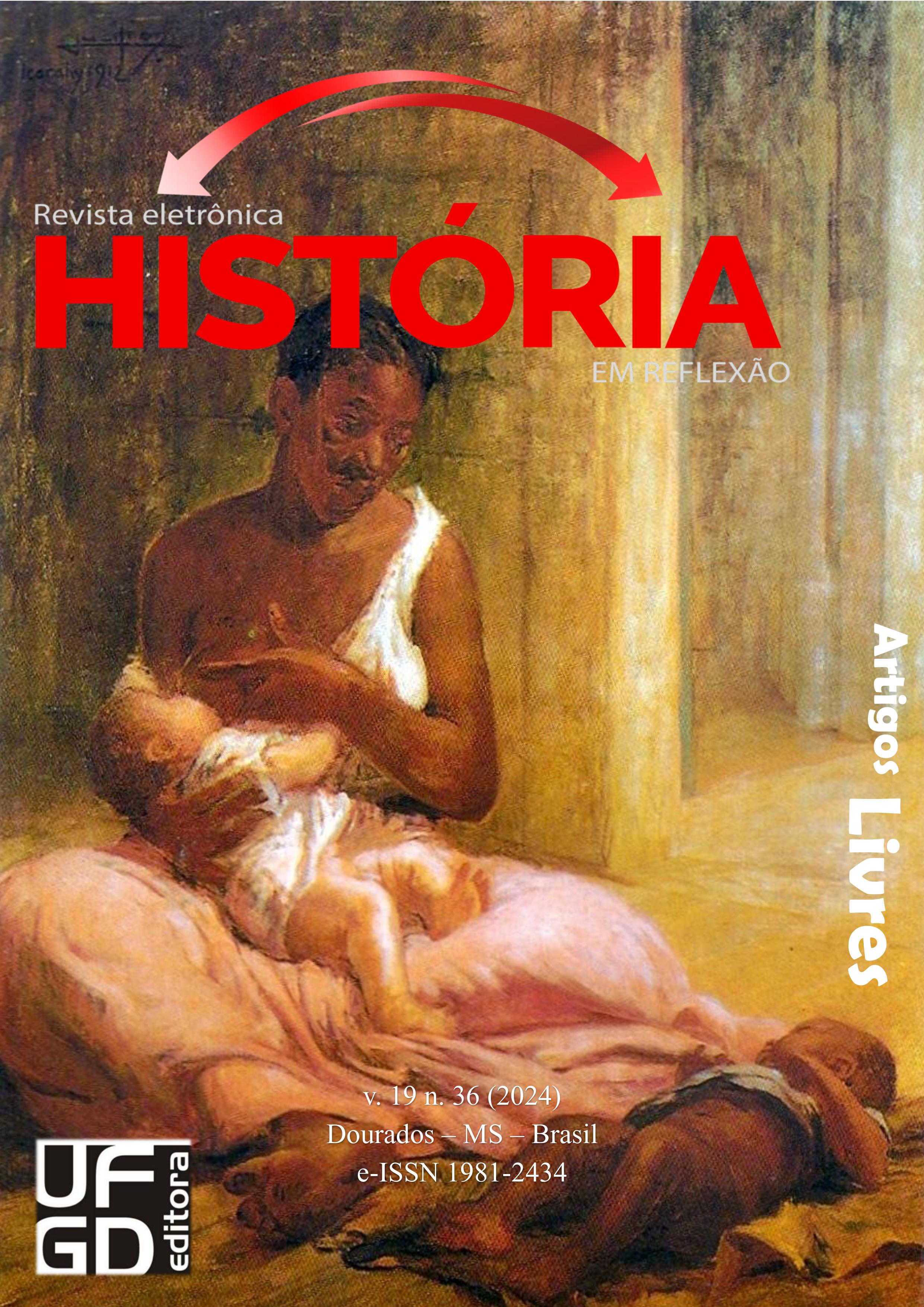O horizonte epistemológico decolonial: reparação histórica através do desfile de 2019 da Estação Primeira de Mangueira
DOI:
https://doi.org/10.30612/rehr.v19i36.17100Palavras-chave:
Eurocentrismo; Decolonialidade; Escolas de Samba; Narrativa; Desfile; Mangueira.Resumo
O objetivo do artigo se torna evidenciar uma nova epistemologia de conhecimento como fio condutor do processo criativo do desfile de escola de samba no ano de 2019 da Estação Primeira de Mangueira. Historicamente, o conhecimento estruturado a partir de um viés de pensamento ocidentalizado, era entrelaçado nas manifestações culturais brasileiras como o fenômeno carnavalesco. A narrativa que os desfiles das escolas de samba retratavam em sua apresentação, reforçava os mitos e equívocos que a historiografia eurocêntrica sistematizou por longos anos, relativizando e amenizando episódios históricos problemáticos, como a invasão e consequentemente a colonização, a escravidão e os genocídios dos verdadeiros proprietários dessas terras, os povos originários. A fim de repensar e reescrever a historiografia tradicional brasileira, o movimento decolonial surge como ruptura epistemologia com o intuito de evidenciar a existência e resistência de negros e indígenas no passado e no presente. No desfile “Historias para ninar gente grande” da Estação Primeira de Mangueira, a episteme decolonial é incorporada no desfile realizando uma reparação histórica frente aos povos indígenas, negros e demais grupos sociais que foram vitimas da colonização e da colonialidade, se tornando nesse desfile os verdadeiros heróis e protagonistas da historia do Brasil.
Downloads
Referências
ADICHIE, Chimamanda. The danger of a single story. New York, NY: TEDGlobal, 2009.
AZEVEDO DE PAULO, Helena Almeida; MELLO, Isabella Nunes. Sobre a Dança da Educação: Um ensaio sobre contribuições indígenas para uma educação não-indígena. ABATIRÁ - REVISTA DE CIÊNCIAS HUMANAS E LINGUAGENS Universidade do Estado da Bahia – UNEB.
CUNHA, Manuela Carneiro. Índios no Brasil: história, direitos e cidadania. Editora Companhia das Letras, 2005.
DOS SANTOS ANTAN, Leonardo. “Exaltando o negro pro mundo inteiro cantar”: inovações e influências da “Revolução Salgueirense” nos desfiles das escolas de samba entre 1959 e 1963. Policromias-Revista de Estudos do Discurso, Imagem e Som, v. 5, n. 4, p. 197-233.
FANON, Frantz. Os condenados da terra. Rio de Janeiro, RJ: Editora Civilização Brasileira. 1968.
FOUCAULT, Michel. Em defesa da Sociedade. Tradução Maria Ermantina Galvão. São Paulo: 1999, p.3-75.
KAYAPO, Edson. BRITO, Tamires. A pluralidade étnico cultural indígena no Brasil: o que a escola tem a ver com isso? Caiacó, v.15, n.35, p.38-68, jul.| dez. 2014. Dossiê Histórias Indígenas.
MELLO, Isabella Nunes; REIS, Mateus Fávaro. Tecendo um colar de horizontes epistemológicos: O protagonismo de Ailton Krenak e Davi Kopenawa para a escrita de histórias plurais. ABATIRÁ - REVISTA DE CIÊNCIAS HUMANAS E LINGUAGENS Universidade do Estado da Bahia - UNEB
MELLO, Isabella Nunes. Cosmo-percepção. HH Magazine, 2020. Disponível em: https://hhmagazine.com.br/cosmo-percepcao/. Acesso em: 6 de fev. 2023.
MIGNOLO, Walter D. Desobediência Epistêmica: A opção descolonial e o significado de identidade em política. Cadernos de Letras da UFF, 2008.
MUSSA, Alberto; SIMAS, Luiz Antônio. Samba de enredo: história e arte. Rio de Janeiro, 2010.
NETO, Lira. Uma história do samba. v.1 (As origens). São Paulo: Companhia das Letras, 2017
QUIJANO, Aníbal. Colonialidade do poder, eurocentrismo e América Latina. In: Buenos Aires: Clacso, 2005, p. 117-142.
SCHWARCZ, Lilia Moritz. Nem preto nem branco, muito pelo contrário. Companhia das Letras, 2009.
VIANNA, Hermano. O mistério do samba. Rio de Janeiro: Editora Zahar, 1995
VIEIRA, Leandro. História para ninar gente grande. In: Livro Abre-alas 2019: segunda-feira. Rio de Janeiro: 2019. p. 307-389. Disponível em: Acesso em: 20 fev. 2023.
Downloads
Publicado
Como Citar
Edição
Seção
Licença
Copyright (c) 2024 Revista Eletrônica História em Reflexão

Este trabalho está licenciado sob uma licença Creative Commons Attribution-NonCommercial-ShareAlike 4.0 International License.
Os autores devem aceitar as normas de publicação ao submeterem a revista, bem como, concordam com os seguintes termos:
(a) O Conselho Editorial se reserva ao direito de efetuar, nos originais, alterações da Língua portuguesa para se manter o padrão culto da língua, respeitando, porém, o estilo dos autores.
(b) Autores mantém os direitos autorais e concedem à revista o direito de primeira publicação, com o trabalho simultaneamente licenciado sob a Atribuição-NãoComercial-CompartilhaIgual 3.0 Brasil (CC BY-NC-SA 3.0 BR) que permite: Compartilhar — copiar e redistribuir o material em qualquer suporte ou formato e Adaptar — remixar, transformar, e criar a partir do material.
A CC BY-NC-SA 3.0 BR considera os termos seguintes:
- Atribuição: Você deve dar o crédito apropriado, prover um link para a licença e indicar se mudanças foram feitas. Você deve fazê-lo em qualquer circunstância razoável, mas de nenhuma maneira que sugira que o licenciante apoia você ou o seu uso.
- NãoComercial: Você não pode usar o material para fins comerciais.
- CompartilhaIgual: Se você remixar, transformar, ou criar a partir do material, tem de distribuir as suas contribuições sob a mesma licença que o original.
- Sem restrições adicionais: Você não pode aplicar termos jurídicos ou medidas de caráter tecnológico que restrinjam legalmente outros de fazerem algo que a licença permita.



